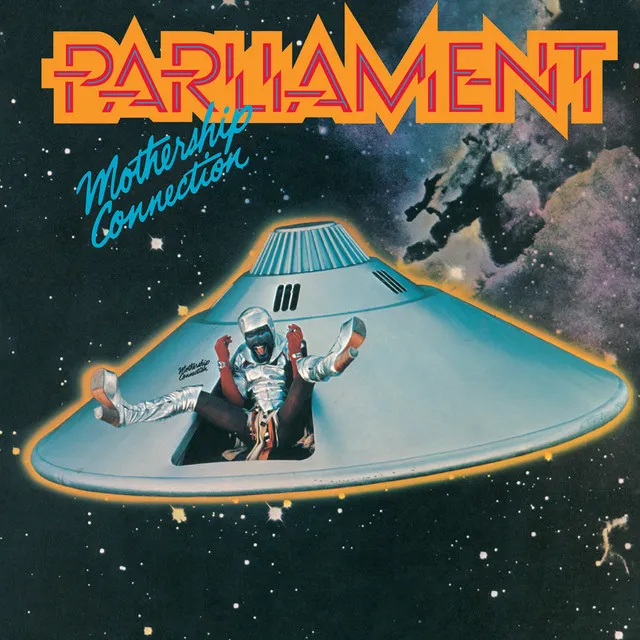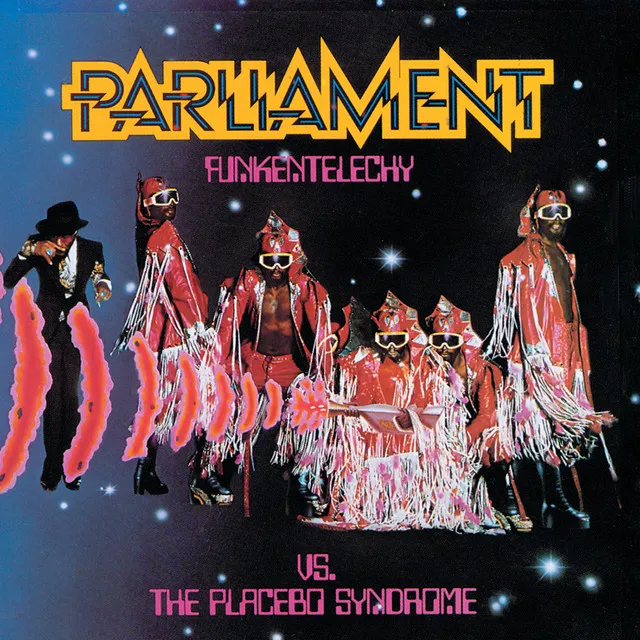Inspired by Motown's assembly line of sound, George Clinton gradually put together a collective of over 50 musicians and recorded the ensemble during the '70s both as Parliament and Funkadelic. While Funkadelic pursued band-format psychedelic rock, Parliament engaged in a funk free-for-all, blending influences from the godfathers (James Brown and Sly Stone) with freaky costumes and themes inspired by '60s acid culture and science fiction. From Parliament's 1970 inception until Clinton's dissolving of the band in 1980, they hit the R&B Top Ten with funk classics such as "Up for the Down Stroke," "Tear the Roof Off the Sucker (Give Up the Funk)," "Flast Light," and "Aqua Boogie (A Psychoalphadiscobetabioaquadoloop)." They truly excelled in two other areas: effective album statements, including the platinum releases Mothership Connection and Funkentelechy vs. the Placebo Syndrome (1977), and the most dazzling, extravagant live show in the business. After Clinton fused his concepts for P-Funk All Stars, he revitalized them separately in the 2010s, first with an album from Funkadelic and then one with Parliament, Medicaid Fraud Dogg (2018).
By the time his on-the-move family settled in New Jersey during the early '50s, George Clinton (born in 1941 in Kannapolis, North Carolina) became interested in doo wop, which was just beginning to explode in the New York-metro area. Basing his group on Frankie Lymon & the Teenagers, Clinton formed the Parliaments in 1955 with a line-up that gradually shifted to include Clarence "Fuzzy" Haskins, Grady Thomas, Raymond Davis, and Calvin Simon. Based out of a barbershop backroom where Clinton straightened hair, the Parliaments released only two singles during the next ten years, but frequent mid-'60s trips to Detroit -- where Clinton began working as a songwriter and producer -- eventually paid off their investment.
After finding a hit with the 1967 single "(I Wanna) Testify," the Parliaments ran into trouble with Revilot Records and refused to record any new material. Instead of waiting for a settlement, Clinton decided to record the same band under a new name: Funkadelic. Founded in 1968, the group began life as a smokescreen, claiming as its only members the Parliaments' backing band -- guitarist Eddie Hazel, bassist Billy Nelson, rhythm guitarist Lucius "Tawl" Ross, drummer Ramon "Tiki" Fulwood, and organist Mickey Atkins -- but in truth including Clinton and the rest of the former Parliaments lineup. Revilot folded not long after, with the label's existing contracts sold to Atlantic; Clinton, however, decided to abandon the Parliaments name rather than record for the major label. One previously recorded Parliaments single, "A New Day Begins," was licensed to Atco in 1969 and became a number 44 hit that May. By 1970, Clinton had regained the rights to the Parliaments name; he then signed the entire Funkadelic lineup to Invictus Records as Parliament. The group released one album -- 1970's Osmium -- and scored a number 30 hit, "Breakdown," on the R&B chart in 1971. With Funkadelic firing on all cylinders, however, Clinton decided to discontinue Parliament (the name, not the band) for the time being.
Though keyboard player Bernie Worrell had played on the original Funkadelic album, his first credit with the conglomeration appeared on Funkadelic's second album, 1970's Free Your Mind...And Your Ass Will Follow. Clinton and Worrell had known each other since the New Jersey barbershop days, and Worrell soon became the most crucial cog in the P-Funk machine, working on arrangements and production for virtually all later Parliament/Funkadelic releases. His strict upbringing and classical training (at the New England Conservatory and Juilliard), as well as the boom in synthesizer technology during the early '70s, gave him the tools to create the synth runs and horn arrangements that later trademarked the P-Funk sound. Two years after the addition of Worrell, P-Funk added its second most famed contributor, Bootsy Collins. The muscular, throbbing bassline of Collins had already been featured in James Brown's backing band (the J.B.'s) along with his brother, guitarist Catfish Collins. Bootsy and Catfish were playing in a Detroit band when George Clinton saw and hired them.
Funkadelic released five albums from 1970 through early 1974, and consistently hit the lower reaches of the R&B chart, but the collective pulled up stakes later in 1974 and began recording as Parliament. Signing with the Casablanca label, Parliament's "Up for the Down Stroke" (number ten R&B, number 63 pop) appeared in mid-1974 and reflected a more mainstream approach than Funkadelic, with funky horn arrangements reminiscent of James Brown and a live feel that recalls contemporary work by Kool & the Gang. It became the biggest hit yet for the Parliament/Funkadelic congregation. "Testify," a revamped version of the Parliaments' 1967 hit, also charted in 1974. One year later, Chocolate City continued Parliament's success: the title track reached number 24 R&B, and "Ride On" also charted.
Clinton & co. ushered in 1976 with the April release of the third Parliament LP in as many years: Mothership Connection. Arguably the peak of Parliament's power, the album made number 13 on the pop chart and went platinum, sparked by three hit singles: "P. Funk (Wants to Get Funked Up)" (number 33 R&B), "Tear the Roof Off the Sucker (Give Up the Funk)" (number five R&B, number 15 pop), and "Star Child" (number 26 R&B). In addition to Bootsy Collins, the album featured two other James Brown refugees: horn legends Maceo Parker and Fred Wesley. Just six months after the release of Mothership Connection, Clinton had another Parliament album in the can, The Clones of Dr. Funkenstein. Though it only reached gold status, the LP spawned the number 22 R&B hit "Do That Stuff" and the number 43 "Dr. Funkenstein."
Several internal squabbles in 1977 apparently didn't phase Clinton at all; the following year proved to be the most successful in Parliament's history. In January, "Flash Light" -- from the Parliament album Funkentelechy vs. the Placebo Syndrome -- became the collective's first number one hit. It topped the R&B chart for three weeks, and was followed by the number 27 single, "Funkentelechy." The LP reached number 13 on the pop chart and became Parliament's second platinum album. Early in 1979, Parliament hit number one yet again with "Aquaboogie," from its eighth album, Motor Booty Affair. The LP, which reached number 23, became the group's fifth consecutive album to go gold or better. Parliament's ninth album, Gloryhallastoopid (Or Pin the Tale on the Funky), was released later in 1979. The group charted in the R&B Top Ten twice during 1980 ("Theme from 'The Black Hole'" and "Agony of Defeet"), but Clinton began to be weighed down that year by legal difficulties arising from Polygram's acquisition of Casablanca.
Jettisoning both the Parliament and Funkadelic names (but not the musicians), Clinton began his solo career with 1982's Computer Games. He and many former Parliament/Funkadelic members continued to tour and record during the '80s as the P-Funk All Stars, but the decade's disdain of everything from the '70s resulted in the neglect of critical and commercial opinion for the world's biggest funk band, especially one which in part had spawned the sound of disco. During the early '90s, the rise of funk-inspired rap (courtesy of Digital Underground, Ice Cube, Dr. Dre, and Warren G., among others) and funk rock (Primus and Red Hot Chili Peppers) re-established the status of Clinton & co., one of the most important forces in the recent history of Black music. Funkadelic reactivated for the 2014 album First Ya Gotta Shake the Gate. Parliament, topical as ever, followed suit four years later with Medicaid Fraud Dogg, which took aim at the pharmaceutical industry. Clarence "Fuzzy" Haskins, a founding member of the Parliaments who became a long-running figure in the P-Funk universe, died on March 17, 2023 at the age of 81. ~ John Bush, Rovi





